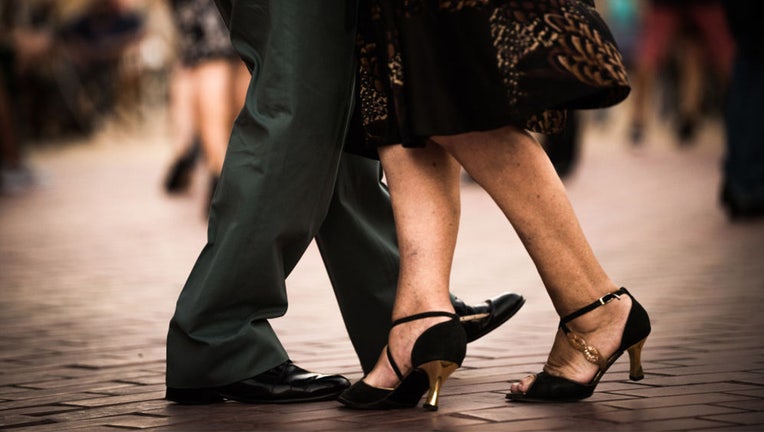Latin dance can help improve your memory as you age, study suggests

FILE - A couple dances the tango in Castelar, Argentina. Credit: Alejo Manuel Avila/picture alliance via Getty Images
Researchers and health care officials have long said consistent physical activity is beneficial for not only one’s physical and mental health but to also help reduce the risk of developing cognitive disabilities such as dementia and Alzheimer’s disease.
However, daily walks can become monotonous, and you can only watch different YouTube exercise videos so many times — so why not add a little spice?
A recent study published in the peer-reviewed journal Frontiers suggests taking up a Latin dance is a surefire way to fill one’s physical activity quota while also improving a person’s working memory in older adults.
Researchers observed two separate groups of people who were 65 years of age on average. Over the course of eight months, one group attended a Latin dance program called "BAILAMOS" and the second group attended a health class.
"The study showed that participants who were randomized to the 4-month Latin dance program followed by a 4-month maintenance phase improved in working memory compared to participants in the health education control group," according to the study.
Working memory, by definition, is the small amount of information that can be held in our brains and used during cognitive tasks. It’s like a "temporary sticky note," allowing us to work with information without losing track of what we’re doing, according to Understood.org, a nonprofit for parents of kids with learning and attention issues.
Disparity among race
All 333 participants were of Latinx descent because, according to researchers, Latinx have a higher risk of developing cognitive disabilities such as Alzheimer’s.
In fact, according to the Us Against Alzheimer’s website, Latinx in the United States are 1.5 times more likely to suffer from Alzheimer’s disease compared to their non-Latino White counterparts.
Researchers predict that at this rate, the number of Latinx who develop Alzheimer’s will increase by 832% by 2060.
"Our study had several strengths including a large sample of community-dwelling older, Spanish-speaking Latinos, a group that is rarely included in large RCTs, but has a high level of need for health-related interventions," according to the study’s authors.
"In sum, this study underscores the importance of creating and delivering culturally relevant, community-based Latin dance programs that promote total (physical activity) and function as a leisure time (physical activity) for Latinos. Furthermore, implementing maintenance phases to create more sustainable programs and empowering community members to lead programs is critical to create a culture of health," the study concluded.
Alzheimer’s and physical activity
According to the January study published in Alzheimer's & Dementia: The Journal of the Alzheimer's Association, researchers noted how exercise increases the strength of proteins that the brain needs to communicate with the rest of the body.
The strengthening of these proteins could improve your chances of fighting off dementia and other cognitive illnesses, according to the study.
Researchers analyzed protein levels in people who donated their brains after death. The average brain came from a person aged 70 to 80 years old.
Researchers also tracked late-life physical activity in elderly living participants. They found that people who were more physically active had higher levels of proteins used by the brain to exhibit healthy cognitive function.
About 50 million people currently have dementia, and Alzheimer’s disease is the most common type. Each year brings 10 million new cases, according to a report released in 2019 by the World Health Organization.
Although age is the top risk factor, "dementia is not a natural or inevitable consequence of aging," the report said.
Many health conditions and behaviors affect the odds of developing it, and research suggests that a third of cases are preventable, said Maria Carrillo, chief science officer of the Alzheimer’s Association, which has published similar advice.
Much of the WHO’s advice is common sense and echoes what the U.S. National Institute on Aging says.
That includes getting enough exercise; treating other health conditions such as diabetes, high blood pressure and high cholesterol; having an active social life, and avoiding or curbing harmful habits such as smoking, overeating and drinking too much alcohol. Evidence is weak that some of these help preserve thinking skills, but they’re known to aid general health, the WHO said.
Austin Williams contributed to this report. This story was reported out of Los Angeles.

